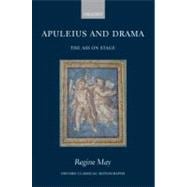
Note: Supplemental materials are not guaranteed with Rental or Used book purchases.
Purchase Benefits
What is included with this book?
| A Note on Texts and Translations | p. xiii |
| Abbreviations | p. xv |
| Introduction | p. 1 |
| Apuleius and Drama: The Purpose of This Book | p. 1 |
| Scholarship and Methodology | p. 4 |
| Comedy, Mime, and the Novel | p. 10 |
| Knowledge of Drama and Archaism in the Second Century | p. 16 |
| Introduction | p. 16 |
| Tragedy and Comedy in Greece | p. 19 |
| Watching Plays in the Roman World | p. 21 |
| Theatrical Archaeology in North Africa | p. 22 |
| Education through Studying Drama: The Sophist's Case | p. 25 |
| Second-Century Archaism and Apuleius | p. 27 |
| Conclusion | p. 43 |
| Drama Philosophy, and Rhetoric: Apuleius' Minor Works | p. 45 |
| Introduction | p. 45 |
| Quotations from Drama in Apuleius' De Deo Socratis | p. 45 |
| De Mundo and De Platone et eius Dogmate | p. 53 |
| Drama in the Florida | p. 55 |
| An Apuleian 'Translation' from Greek Comedy: Anechomenos | p. 63 |
| Conclusion | p. 71 |
| Courtroom Drama: Apuleius' Apologia | p. 73 |
| Introduction | p. 73 |
| Exordium ('Introduction') 1-3 | p. 80 |
| Refutation of Subsidiary, Non-magical Charges 4-24 | p. 81 |
| Refutation of 'Minor' Magical Charges 25.5-65 | p. 87 |
| Refutation of 'Major' Charges concerning Pudentilla's Marriage 66-101 | p. 99 |
| Conclusion | p. 106 |
| The Texture of the Metamorphoses | p. 109 |
| Introduction | p. 109 |
| The Prologue | p. 110 |
| Comedy in Prose: Comic Elements of the Narrative Texture | p. 115 |
| Conclusion | p. 127 |
| The Drama of Aristomenes and Socrates | p. 128 |
| Introduction | p. 128 |
| Dramatic Posturing | p. 129 |
| What Kind of Drama? | p. 132 |
| Crossing the Genres | p. 139 |
| Metatheatre and Metafiction | p. 140 |
| Conclusion | p. 141 |
| A Parasite in a Comic Household | p. 143 |
| Introduction | p. 143 |
| Lucius' Comic Characterization: Lucius as a Parasite? | p. 143 |
| Milo's House: A domus comica ('Comic Household') | p. 156 |
| Conclusion | p. 180 |
| The Risus Festival: Laughing at Laughter | p. 182 |
| Introduction | p. 182 |
| Comedy and Theatrical Setting | p. 182 |
| Risus Festival: History or Apuleian Invention? | p. 187 |
| The God Risus and his Sources | p. 188 |
| Why 'Laughter'? | p. 190 |
| Forum and Theatre: The Setting of the Trial | p. 192 |
| The Crime: Killing the Wineskins | p. 195 |
| Apuleius and Aristophanes | p. 198 |
| Young Drunkards | p. 202 |
| Actor and Auctor | p. 205 |
| Conclusion | p. 205 |
| Cupid and Psyche: A Divine Comedy | p. 208 |
| Introduction | p. 208 |
| Elements of Tragedy | p. 209 |
| Beyond Tragedy | p. 212 |
| Comedy | p. 215 |
| Mythological Travesties in Comedy: Plautus' Amphitruo | p. 216 |
| Plautine Tragicomedy and Apuleius' Cupid and Psyche | p. 219 |
| Apuleius' dramatis personae | p. 221 |
| Conclusion | p. 246 |
| Charite: How Comedies Do Not End | p. 249 |
| Introduction | p. 249 |
| The Old Woman as a Dramatic Nurse | p. 250 |
| Charite's Dream | p. 252 |
| Feminine Suicides | p. 255 |
| Scaena and persona | p. 257 |
| Charite's Comedy | p. 260 |
| Charite's Tragedy | p. 265 |
| Conclusion | p. 268 |
| 'Seneca cannot be too heavy, nor Plautus too light': Metamorphoses, Book 10 | p. 269 |
| Introduction | p. 269 |
| The Inset Tales: 'Phaedra' and 'Menander' | p. 270 |
| The Main Narrative: 'Miles gloriosus' and 'Cooks' | p. 295 |
| Conclusion | p. 305 |
| The End: Isis: Dea ex machina? | p. 307 |
| Introduction | p. 307 |
| Tragedy | p. 307 |
| Comedy | p. 310 |
| 'Why Isis?' | p. 318 |
| The Anteludia | p. 324 |
| Conclusion and Outlook | p. 327 |
| Conclusion | p. 329 |
| Bibliography | p. 333 |
| Index | p. 359 |
| Table of Contents provided by Ingram. All Rights Reserved. |
The New copy of this book will include any supplemental materials advertised. Please check the title of the book to determine if it should include any access cards, study guides, lab manuals, CDs, etc.
The Used, Rental and eBook copies of this book are not guaranteed to include any supplemental materials. Typically, only the book itself is included. This is true even if the title states it includes any access cards, study guides, lab manuals, CDs, etc.